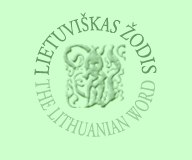-
-
- The knygnesiai (booksmuglers) movement
and rejection of Cyrillic Lithuanian publications were not the only
means of resistance. Legal protest, appeals in the courts and other
means were used to circumvent the ban. A few Lithuanian intellectuals,
with help from Russian academicians and liberal sympathizers, managed
to publish some Lithuanian books in the Latin alphabet during the
press ban period. The Academy of Sciences in St. Petersburg published
Kristijonas Donelaitis' Metai (The Seasons) in 1865. Petras
Vileisis persuaded government censors to allow the publication of
several books in the Latin alphabet in 1876 and 1877. Academic works
published in Russia proper were exempted from the press ban after
1880. The University of Kazan, for example, published A. Juska's Lietuviskos
dainos {Lithuanian Songs). Although these publications were not
widely read in Lithuania, they weakened the legal and administrative
foundations of the press ban.
- At the turn of the century, the
Lithuanian intelligentsia and the illegal press increased their
efforts to repeal the press ban, emphasizing legal means and public
protests. They organized a letter writing campaign to the Tsar, the
Minister of the Interior, and other officials. The peasants, in their
petitions, demanded Lithuanian instruction in the rural schools and
books in the Latin alphabet.
- Eventually, the complete failure of the
Cyrillic reform, the inability to contain contraband in illegal
Lithuanian publications and the rising tide of public protest showed
that the press ban was unworkable. Russia's Council of Ministers
Considered the Lithuanian press ban on October 28, 1897, and concluded
that there was no practical way to halt the flow of the illegal press
Into Lithuania. The ministers estimated that even with strict German
cooperation, not all of the illegal press could be halted since at
least a third of the publications came from the United States. In May,
1898, the Academic Committee (Uchebnyi Komitet) of the Ministry
of Education concluded in a special report that the Cyrillic reform
was a failure and that the press ban should be repealed. The committee
complained that the press ban had produced completely unexpected
results, one of which was the development of strong Lithuanian
nationalism. Some Russian officials in Lithuania felt that the press
ban needlessly antagonized the people against the Tsarist regime and
that it was in the interest of the Russian state to have a legal
Lithuanian press which could be censored. Prince Sviatopolk-Mirsky,
who became govern or general in 1902, reported to St. Petersburg that
“the Cyrillic script has not established itself among the
Lithuanians” and that, despite the government's efforts, illegal
publications were “spreading throughout the Northwest Territory [i.
e. Lithuania] by the tens of thousands.” The governor general urged
the Tsar to repeal the press ban. The press ban was shown to have no
legal basis when in 1902 and 1903 the Russian Senate (Supreme Court)
reversed two convictions in press ban cases (against Antanas
Macijauskas and Povilas Visinskis). The reversals were based on the
Senate's opinion that the original executive decree which had
promulgated the press ban was illegal. Finally, the out break of the
Russo Japanese war per suaded the Tsarist government of the need for
placating Russia's nations minorities. The ban on Lithuanian
publications in the Latin alphabet was lifted by the Tsar on April 24,
1904.
- The press ban and the resistance it
aroused among the people were the central events in the history of the
Lithuanian national movement in the 19th century. The struggle against
the press ban mobilized and developed Lithuanian forces. Furthermore,
the press ban created among the Lithuanian nation at large a
tremendous feeling of national injustice and the sense of being
singled out for especially harsh treatment. Vincas Kudirka wrote in
the first issue of Varpas (January, 1889) that the situation of
the Lithuanians was “far worse than that of the Jews or Tatars who
are not prevented from speaking their language, publishing newspapers
or maintaining schools.” The press ban was originally conceived to
bring Lithuanian peasantry into closer relations with Russia and
Russian culture. In fact, by arousing their specifically Lithuanian
national feelings and inspiring them to effective resistance against
Russification, it managed to achieve the exactly opposite result.
-
Text
from the ENCYCLOPEDIA LITUANICA I-VI. Boston, 1970-1978

